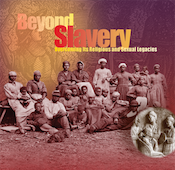Beyond Slavery
Explore the Conference
Explore the Conference by Subject
Slavery in Christian, Jewish, and Muslim Scripture and Religious Law
Christianity, Religion of the Slaveholders and the Enslaved
Sexual Assault and Exploitation Under U.S. Slavery and Jim Crow
How Slavery Has Shaped Our Understandings of Marriage and Friendship
Slavery, Violence, and the State
Beyond Slavery:
Overcoming Its Religious
& Sexual Legacy
Frances Smith Foster:
Call Me "Mrs.": Motherhood, Marriage, and (Sexual) Morality in Nineteenth-Century African America
Nearly a half century after legal desegregation in the United States, integration is still a concept rather than a reality for most people. Although many of those who fought for civil and women's rights believed that women and girls would "naturally" lead the way into a brave new world by forging intimate, enduring friendships, this has not happened. Why? The responsibility lies with the way we think about one another and ourselves. Slavery may be only a story to be passed on. Race may be a biologically nonsensical notion. But the definitions, narratives, and assumptions about slavery are still with us today. Sexual morality is not just about individual decisions. The stories we have long told about women of different ethnic groups shape our moral imagination and hinder the interracial sisterhood necessary for creating sexual justice for all women. Silences or omissions and selective memories or statements repeated so often that folks forget they never were facts debilitate our mutual trust and respect. Even the elements of our system that oppress and confine are justified by the words that we use. However, we need to do more than change the words, stories, and interpretations that now prevail. Feminist sexual ethics can be the first step toward changing public policy, healing individual psyches, and nurturing friendships that last.
This video was recorded on October 15-16, 2006 as part of the conference, "Beyond Slavery: Overcoming Its Religious and Sexual Legacy." It was sponsored by the Feminist Sexual Ethics Project in the Near Eastern and Judaic Studies Department at Brandeis University.
